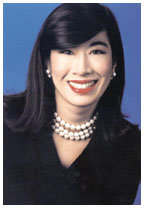Have an opinion about this issue of PAW? Please take a minute to click here and fill out our online questionnaire. It’s an easy way to let the editors know what you like and dislike, and how you think PAW might do better. |
Courtesy Avon Products Inc. |
Andrea Jung ’79
Andrea Jung ’79 took over as CEO of Avon Products Inc. five years ago, and ever since, she has been giving the cosmetics giant a makeover — overseeing new product lines, including one aimed at college-age customers; moving the company into new markets in Russia, China, and soon the Middle East; emphasizing research and development; and upgrading the company’s advertising. Both Avon’s sales and stock price have increased as a result. Jung, a former University trustee, spoke to PAW’s Mark F. Bernstein ’83.
You were the first woman CEO of a major cosmetics company. Have things improved for women CEOs generally in the five years since you took over?
There’s the presumption that the beauty-care industry would have had a larger share of women CEOs than it has. But while several women founded cosmetics companies — Helena Rubinstein, Coco Chanel, and Estee Lauder, for example — and their customer base has always been predominantly women, the management at those companies always has been predominantly men. There aren’t necessarily more women in the top spot at big companies now than there were five years ago, but there are many more in the serious number-two positions, ready to move up to number one. I think in the next five to 10 years there are going to be a significant number of women running Fortune 500 companies.
A recent profile of you in Newsweek noted Avon’s reputation as a family-friendly place to work. How do you create that culture?
What the boss does is looked at very closely, so I know there’s a microscope on how I balance work and family. [Jung is the mother of two children.] I think we really make an effort to let people know that you can be open about saying, “I’m going at 3 in the afternoon to a soccer game.” I want people to know that’s OK. If I let them know it’s OK, that sends a very infectious message throughout the corporation.
Who and where are today’s Avon ladies?
We offer people who have full-time jobs an opportunity to earn money on the side or on weekends. We have many people who join us because they have children and they want to balance it. Avon gives them an opportunity to do something they really like, but on their own time. I think we are the number-one source of secondary income in the world. Almost 70 percent of our business is now done outside the United States, and we have booming markets in China and Russia. We hope to move into Turkey, too. Avon plays an important role in those countries because we teach women how to run their own businesses and be economically independent.
How do you introduce beauty products into markets where they have not been widely used before?
That’s where the direct sales force comes in. We are by nature a grassroots, word-of-mouth business. A woman always will believe her neighbor or her sister over something she hears from a training program or an advertising campaign. And we have nearly 5 million independent sales representatives who are in the communities, at the schools, in the workplaces. They have a personal relationship and the trust that allows them to educate people — to explain, “This is why I use it, this is what it did for me, and here’s how you can benefit from it.”
Is there a universal ideal of beauty?
There are nuances. Ten years ago, we marketed by geography, assuming that product needs were different by market, but we found that women around the world had very similar desires for products. Of course, there are formula differences between markets. Someone in a warmer climate may prefer a lighter lotion than a thicker cream, for example. But there has been a major shift in women’s definition of beauty — that it’s not how you look, it’s how you feel. That is universal. The changing definition of beauty worldwide is trying to stay younger by staying fit, feeling good about yourself, and feeling independent.
Is it true that Avon saleswomen are now knocking on doors at college campuses?
Yes, we recently introduced a new brand that was designed not just to be at the cosmetics counter at the U-Store, but to give college women an opportunity to run their own businesses. It’s about allowing women in college to have a job and earn extra income, but have a flexible working opportunity. We have used this to train them to be their own CEO, be an entrepreneur, and run their own business. And we’re not just selling heavy makeup, but grooming and skin-care products, too. It’s as much about health as it is about appearance for people who are 18 to 24.
Did you use cosmetics when you were at Princeton?
I used less than a lot of girls are using today. ![]()


